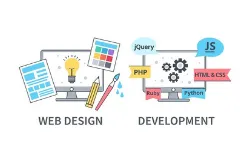How do I put AWS skills on my resume?
The current dynamic tech environment makes AWS competencies an essential tool in increasing both your professionalism and your pay cheque. Whether you are a senior professional with great experience or have just a few months of experience in the industry, the fact that you should be able to demonstrate your AWS skills effectively on the resume is very paramount in gaining the desired job. Apponix can help you acquire the skills for the AWS platform that is easily recognizable to employers.
Why Highlight AWS Skills?
The importance of AWS skills cannot be overstated, however, before doing a walkthrough of how to incorporate these skills in your resume, let's quickly have a look at why highlighting these skills is essential to employers. AWS is the number-one cloud services provider worldwide, ensuring growth for organizations whose technology infrastructure is competitively enabled. With an increasing number of businesses and organizations that are relocating their infrastructure to the cloud, AWS expert's skill sets keep topping the recruitment list.
When you list AWS proficiency on your resume, you tell potential employers that you have the skills to leverage the latest technology solutions to improve efficiency, optimize workflow, and potentially outperform competitors. Such strategic implementation has made organizations highly aggressive in securing talent for their cloud programs. Today’s job market is seeing an increase in the demand for candidates with AWS skill sets due to employers, thus certification is currently more necessary than ever.
Crafting Your AWS Resume
Now that we understand the importance of highlighting AWS skills let's delve into how you can effectively incorporate them into your resume:
Create a Dedicated Skills Section:
First of all, make the setting to have the whole section of your resume entirely dedicated to your AWS skills. Mention the listed Amazon Web Services services that you are skilled with, for instance – EC2, S3, RDS, Lambda, Iam, and others. Make sure you approximate certificates earned, for instance, AWS Certified Solution Architect or AWS Certified Developer.
Show Them with Examples:
Instead of just listing your AWS skills, give concrete examples of how you have applied them in real-life situations. For example, talk about projects where you have built scalable architectures on AWS from scratch, migrated applications to the cloud or automated workflows using CloudFormation and Lambda.
Quantify Your Achievements:
Quantify your achievements wherever possible to demonstrate the impact of your AWS expertise. For instance, indicate cost savings realized through AWS optimization, system performance improvements and reduced downtime and maintenance.
Customize Your Resume
Customize your resume for every job application by highlighting the most relevant AWS skills and experiences. Read the job description keenly and ensure you align your AWS capabilities with the employer’s requirements so that your CV can stand out.
How Apponix helps build an AWS skillful resume
To mention these skills on a resume even when one is building their resume around skills implementable in any organization, highlight experience with demanding technology services in Amazon Web Services (AWS).
Here are some tips on how to show off your Amazon Web Services skills effectively:
Identify pertinent Amazon Web Services proficiencies: Think about those abilities that are widely sought-after within the Amazon Web Services community like database management, storage options AI & ML(artificial intelligence & machine learning), DevOps, and cloud computing.
Becoming very specific: An example of this could be to explain how you have used AWS services in your previous projects or roles. For instance, creating and managing VPCs, configuring security groups or automating deployments with AWS CloudFormation5.
Mentioning certifications: If you have obtained any AWS certifications such as the AWS Certified Solutions Architect or SysOps Administrator, then ensure to put them on your resume. This confirms that you are updated with the latest best practices for AWS.
Customize your resume for a particular vacancy: Use something like Teal’s Resume to Job Description Comparison tool to see how well your CV fits into the job description This will enable you to identify gaps in skills or experience hence making necessary adjustment on your C.V.
Using Apponix for training: Apponix offers AWS certification training courses, which can help you gain valuable skills and experience in AWS technologies. Completing an Apponix certification course can also show that one is serious about learning and improving their skills for working on Amazon Web Services.







